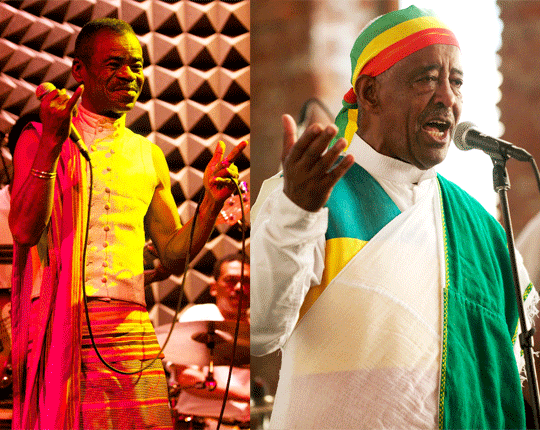Blog July 29, 2014
Jaojoby and Mahmoud Ahmed: Two African Giants Visit New York
This past week, New York was graced with the presence of two legendary Afropop singer/bandleaders. Eusebe Jaojoby of Madagascar at age 58 and Mahmoud Ahmed of Ethiopia at 72 are both old enough to have lived the modern history of African music, from its post-independence giddiness to its subsequent collisions with political and economic challenges, and radical culture change. This is why, seeing these tremendously alluring performers wowing New York crowds in 2014, doing what they’ve always done best, was so heartening.
Jaojoby was in town on his second tour with Wake Up Madagascar (the first was in 2012), a superb collaborative effort between him, singer/bandleader Razia Said, the salegy ensemble Saramba, and guitar ace Charles Kely. The shifting band that accompanied all these acts—including as many as four guitarists and a rich chorus of backing singers—was a combination of Jaojoby’s and Razia’s band members, and they worked together seamlessly. But when Jaojoby took the microphone to sing salegy classics like “Malembe” and “Soumaiko Soumainao,” something truly special happened. This act features a number of fine singer/songwriters, even beyond the four headliners, but there’s no mistaking the power of a figure like Jaojoby, whose every gesture and utterance conveys the confidence and mastery of a man who has been holding the reins in a galloping dance band literally for decades.
Eusebe Jaojoby first began singing as a teenager in the northern Madagascar port town of Diego Suarez. The year was 1970, and Jaojoby started out channeling r&b and soul stars like Percy Sledge, Otis Redding and James Brown, mixed in with popular Latin dance styles. But he soon gravitated toward Madagascar’s own 6/8 dance style, salegy, with roots in local folklore. During Afropop’s recent visit to Madagascar—about which, much more to come—Jaojoby told us he rejects the adulation of journalists who like to call him “the king of salegy.” He may deserve the title, but he’s too modest to claim it.
[caption id="attachment_19724" align="aligncenter" width="600"]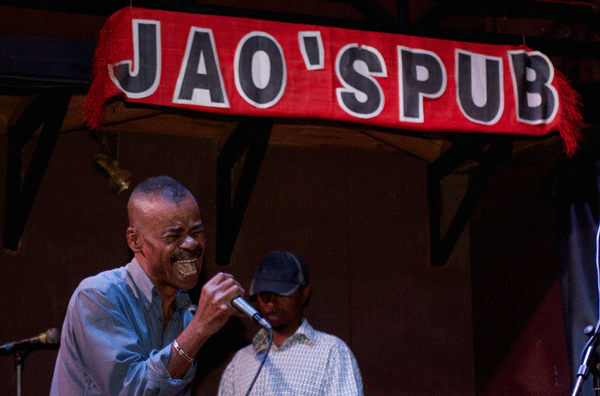 Jaojoby singing at Jao's Pub in Antananarivo (Eyre 2014)[/caption]
Wake Up Madagascar performed three times in New York City this July. The first and most formally polished was a powerhouse set at Joe’s Pub, a venue Jaojoby holds dear because it’s where he and his own band played their first U.S. show some 10 years ago. In fact, when Jaojoby opened his own nightclub in Antananarivo, Madagascar, he named it Jao’s Pub! Wake Up Madagascar also played a looser, jammier set at Ginny’s Supper Club in Harlem a couple of nights later, and hosted a free-flowing jam session at Madiba in Brooklyn on July 25. At this last show, Jaojoby and Razia (co-directors of Wake Up Madagascar) gave the players lots of room to solo and improvise. But once again, it was when Jaojoby unleashed his powerful, husky voice—strong and loud enough to ride over anything these musicians could pump out—that this reviewer felt chills down the back of the spine.
[caption id="attachment_19725" align="aligncenter" width="600"]
Jaojoby singing at Jao's Pub in Antananarivo (Eyre 2014)[/caption]
Wake Up Madagascar performed three times in New York City this July. The first and most formally polished was a powerhouse set at Joe’s Pub, a venue Jaojoby holds dear because it’s where he and his own band played their first U.S. show some 10 years ago. In fact, when Jaojoby opened his own nightclub in Antananarivo, Madagascar, he named it Jao’s Pub! Wake Up Madagascar also played a looser, jammier set at Ginny’s Supper Club in Harlem a couple of nights later, and hosted a free-flowing jam session at Madiba in Brooklyn on July 25. At this last show, Jaojoby and Razia (co-directors of Wake Up Madagascar) gave the players lots of room to solo and improvise. But once again, it was when Jaojoby unleashed his powerful, husky voice—strong and loud enough to ride over anything these musicians could pump out—that this reviewer felt chills down the back of the spine.
[caption id="attachment_19725" align="aligncenter" width="600"]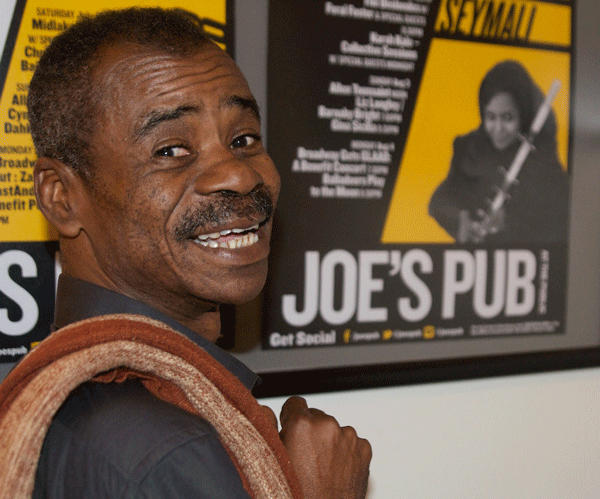 Jaojoby at Joe's Pub, New York City (Eyre 2014)[/caption]
How great is summer in New York when the day after all this Malagasy excitement, one could hear yet another venerable African bandleader, Mahmoud Ahmed, in a rare live performance? Anyone familiar with the remarkable Éthiopiques CD series from Buda Musique is likely to know the voice of this pioneering Ethiopian singer. After all, Ahmed has songs on a number of the series’ 20-plus volumes. His is an ageless voice, at once joyous and heart-rending, and—like Jaojoby’s—definitive and strong enough to ride herd over a powerhouse band. In Ahmed’s case, most of the players come from the DC area, where he also lives roughly half the year when not touring or back in Ethiopia. Francis Falceto, creator of the Éthiopiques series, was on hand for this concert, and explained that Ahmed maintains at least three working bands in the U.S., France and Ethiopia respectively.
[caption id="attachment_19723" align="aligncenter" width="600"]
Jaojoby at Joe's Pub, New York City (Eyre 2014)[/caption]
How great is summer in New York when the day after all this Malagasy excitement, one could hear yet another venerable African bandleader, Mahmoud Ahmed, in a rare live performance? Anyone familiar with the remarkable Éthiopiques CD series from Buda Musique is likely to know the voice of this pioneering Ethiopian singer. After all, Ahmed has songs on a number of the series’ 20-plus volumes. His is an ageless voice, at once joyous and heart-rending, and—like Jaojoby’s—definitive and strong enough to ride herd over a powerhouse band. In Ahmed’s case, most of the players come from the DC area, where he also lives roughly half the year when not touring or back in Ethiopia. Francis Falceto, creator of the Éthiopiques series, was on hand for this concert, and explained that Ahmed maintains at least three working bands in the U.S., France and Ethiopia respectively.
[caption id="attachment_19723" align="aligncenter" width="600"]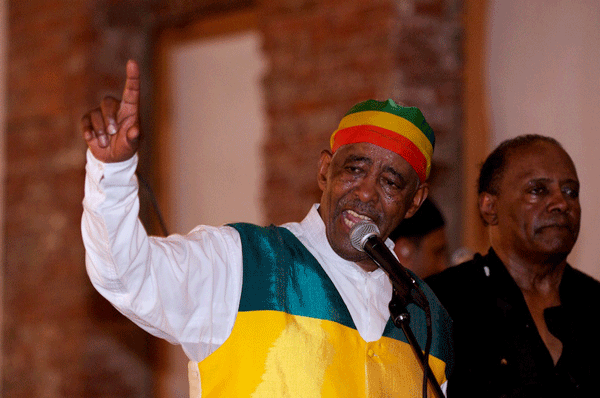 Mahmoud Ahmed at Pioneer Works, Brooklyn (Eyre 2014)[/caption]
Ahmed’s show took place Sat., July 26 at Pioneer Works Center for Arts and Innovation in Red Hook, Brooklyn, part of a long afternoon and evening of music presented by ISSUE Project Room. The preceding acts leaned more in the free jazz direction, so apart from a small Ethiopian contingent, the large audience that filled Project Works—formerly an iron factory, I am told—seemed to be mostly uninitiated in the joys of classic Ethiopian pop. But it didn’t take them long to catch on. Once Ahmed began peeling off richly ornamented melodies over the rolling, funky grooves, heads started bobbing and hips swaying. By the end of a nearly two-hour set that included many songs familiar to Éthiopiques heads, they were dancing, hooting and singing along on cue like true aficionados.
I have somehow managed to miss the handful of times Mahmoud Ahmed has played New York in the past decade, so this was an initiation for me as well. Ahmed’s band featured a strong three-man saxophone section that included one American player—Russ Gershon of the Either Orchestra out of Boston. This group, however assembled, seemed 100 percent in control of the material, segueing between songs, nailing intros and endings, roaring to ecstatic heights of energy, then diving down to a simmer to make room for Ahmed’s vocal, which could also roar, but also whisper and coo at times, as on the timeless Ethiopian ballad “Tizita.”
[caption id="attachment_19727" align="aligncenter" width="600"]
Mahmoud Ahmed at Pioneer Works, Brooklyn (Eyre 2014)[/caption]
Ahmed’s show took place Sat., July 26 at Pioneer Works Center for Arts and Innovation in Red Hook, Brooklyn, part of a long afternoon and evening of music presented by ISSUE Project Room. The preceding acts leaned more in the free jazz direction, so apart from a small Ethiopian contingent, the large audience that filled Project Works—formerly an iron factory, I am told—seemed to be mostly uninitiated in the joys of classic Ethiopian pop. But it didn’t take them long to catch on. Once Ahmed began peeling off richly ornamented melodies over the rolling, funky grooves, heads started bobbing and hips swaying. By the end of a nearly two-hour set that included many songs familiar to Éthiopiques heads, they were dancing, hooting and singing along on cue like true aficionados.
I have somehow managed to miss the handful of times Mahmoud Ahmed has played New York in the past decade, so this was an initiation for me as well. Ahmed’s band featured a strong three-man saxophone section that included one American player—Russ Gershon of the Either Orchestra out of Boston. This group, however assembled, seemed 100 percent in control of the material, segueing between songs, nailing intros and endings, roaring to ecstatic heights of energy, then diving down to a simmer to make room for Ahmed’s vocal, which could also roar, but also whisper and coo at times, as on the timeless Ethiopian ballad “Tizita.”
[caption id="attachment_19727" align="aligncenter" width="600"]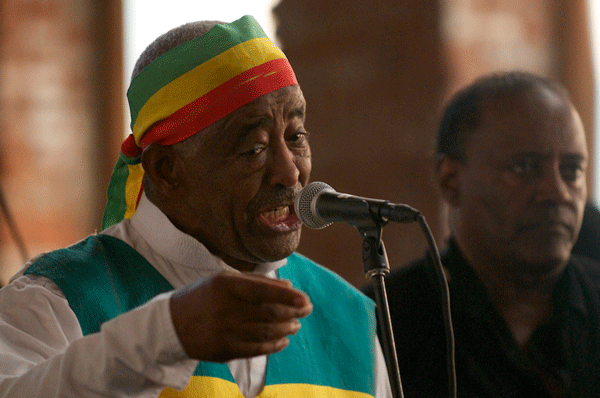 Mahmoud Ahmed at Project Works in Brooklyn (Eyre 2014)[/caption]
Another connection with Jaojoby is the r&b education that both singers clearly underwent early in their careers. Ahmed’s Ethio-pop owes even more to soul and funk aesthetics than does salegy. The marriage of funky grooves and snappy pop arrangements with the mysterious elusiveness of Amharic scales and melodic ornamentations sounds as fresh and exciting today as it must have in Addis Ababa in the late ‘60s when folks like Ahmed were first inventing it.
That soul connection also helps explain how this sophisticated young Brooklyn audience cottoned to this dark and funky, decades-old music so readily. These days, Afrobeat is everywhere, one genre Afropop elders and Brooklyn hipsters can both love. Ethiopian pop like Mahmoud Ahmed’s runs a close second in this race. It lacks the accessibility of English lyrics and firebrand politics, but musically, it is a sound American ears find easy to hear and hard to resist. That’s especially true when it comes from a bandleader with the voice, confidence and charisma of Mahmoud Ahmed.
Singer/bandleaders like Jaojoby and Ahmed continue to emerge. But there’s something unique about the great ones who came of age in the heady ‘70s in Africa. The best of them carry themselves like kings and queens, and deliver vocal artistry that instantly justifies their positions of power. Count on New York to host two such giants in the same summer week.
[caption id="attachment_19726" align="aligncenter" width="600"]
Mahmoud Ahmed at Project Works in Brooklyn (Eyre 2014)[/caption]
Another connection with Jaojoby is the r&b education that both singers clearly underwent early in their careers. Ahmed’s Ethio-pop owes even more to soul and funk aesthetics than does salegy. The marriage of funky grooves and snappy pop arrangements with the mysterious elusiveness of Amharic scales and melodic ornamentations sounds as fresh and exciting today as it must have in Addis Ababa in the late ‘60s when folks like Ahmed were first inventing it.
That soul connection also helps explain how this sophisticated young Brooklyn audience cottoned to this dark and funky, decades-old music so readily. These days, Afrobeat is everywhere, one genre Afropop elders and Brooklyn hipsters can both love. Ethiopian pop like Mahmoud Ahmed’s runs a close second in this race. It lacks the accessibility of English lyrics and firebrand politics, but musically, it is a sound American ears find easy to hear and hard to resist. That’s especially true when it comes from a bandleader with the voice, confidence and charisma of Mahmoud Ahmed.
Singer/bandleaders like Jaojoby and Ahmed continue to emerge. But there’s something unique about the great ones who came of age in the heady ‘70s in Africa. The best of them carry themselves like kings and queens, and deliver vocal artistry that instantly justifies their positions of power. Count on New York to host two such giants in the same summer week.
[caption id="attachment_19726" align="aligncenter" width="600"]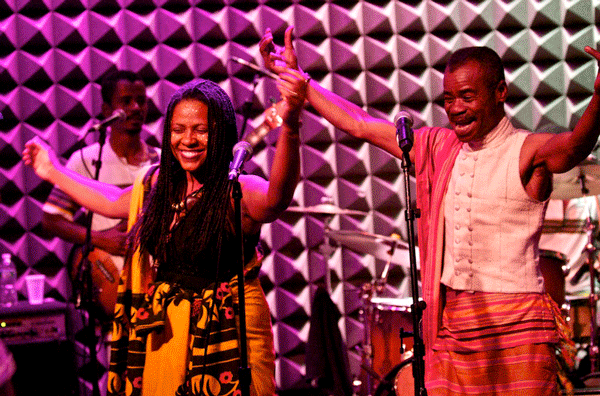 Claudine and Eusebe Jaojoby at Joe's Pub, New York with Wake Up Madagascar (Eyre 2014)[/caption]
[caption id="attachment_19722" align="aligncenter" width="600"]
Claudine and Eusebe Jaojoby at Joe's Pub, New York with Wake Up Madagascar (Eyre 2014)[/caption]
[caption id="attachment_19722" align="aligncenter" width="600"]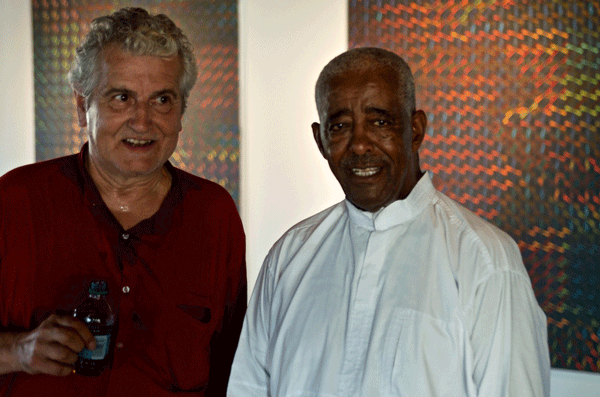 Francis Falceto and Mahmoud Ahmed in Brooklyn (Eyre 2014)[/caption]
Francis Falceto and Mahmoud Ahmed in Brooklyn (Eyre 2014)[/caption]
 Jaojoby singing at Jao's Pub in Antananarivo (Eyre 2014)[/caption]
Wake Up Madagascar performed three times in New York City this July. The first and most formally polished was a powerhouse set at Joe’s Pub, a venue Jaojoby holds dear because it’s where he and his own band played their first U.S. show some 10 years ago. In fact, when Jaojoby opened his own nightclub in Antananarivo, Madagascar, he named it Jao’s Pub! Wake Up Madagascar also played a looser, jammier set at Ginny’s Supper Club in Harlem a couple of nights later, and hosted a free-flowing jam session at Madiba in Brooklyn on July 25. At this last show, Jaojoby and Razia (co-directors of Wake Up Madagascar) gave the players lots of room to solo and improvise. But once again, it was when Jaojoby unleashed his powerful, husky voice—strong and loud enough to ride over anything these musicians could pump out—that this reviewer felt chills down the back of the spine.
[caption id="attachment_19725" align="aligncenter" width="600"]
Jaojoby singing at Jao's Pub in Antananarivo (Eyre 2014)[/caption]
Wake Up Madagascar performed three times in New York City this July. The first and most formally polished was a powerhouse set at Joe’s Pub, a venue Jaojoby holds dear because it’s where he and his own band played their first U.S. show some 10 years ago. In fact, when Jaojoby opened his own nightclub in Antananarivo, Madagascar, he named it Jao’s Pub! Wake Up Madagascar also played a looser, jammier set at Ginny’s Supper Club in Harlem a couple of nights later, and hosted a free-flowing jam session at Madiba in Brooklyn on July 25. At this last show, Jaojoby and Razia (co-directors of Wake Up Madagascar) gave the players lots of room to solo and improvise. But once again, it was when Jaojoby unleashed his powerful, husky voice—strong and loud enough to ride over anything these musicians could pump out—that this reviewer felt chills down the back of the spine.
[caption id="attachment_19725" align="aligncenter" width="600"] Jaojoby at Joe's Pub, New York City (Eyre 2014)[/caption]
How great is summer in New York when the day after all this Malagasy excitement, one could hear yet another venerable African bandleader, Mahmoud Ahmed, in a rare live performance? Anyone familiar with the remarkable Éthiopiques CD series from Buda Musique is likely to know the voice of this pioneering Ethiopian singer. After all, Ahmed has songs on a number of the series’ 20-plus volumes. His is an ageless voice, at once joyous and heart-rending, and—like Jaojoby’s—definitive and strong enough to ride herd over a powerhouse band. In Ahmed’s case, most of the players come from the DC area, where he also lives roughly half the year when not touring or back in Ethiopia. Francis Falceto, creator of the Éthiopiques series, was on hand for this concert, and explained that Ahmed maintains at least three working bands in the U.S., France and Ethiopia respectively.
[caption id="attachment_19723" align="aligncenter" width="600"]
Jaojoby at Joe's Pub, New York City (Eyre 2014)[/caption]
How great is summer in New York when the day after all this Malagasy excitement, one could hear yet another venerable African bandleader, Mahmoud Ahmed, in a rare live performance? Anyone familiar with the remarkable Éthiopiques CD series from Buda Musique is likely to know the voice of this pioneering Ethiopian singer. After all, Ahmed has songs on a number of the series’ 20-plus volumes. His is an ageless voice, at once joyous and heart-rending, and—like Jaojoby’s—definitive and strong enough to ride herd over a powerhouse band. In Ahmed’s case, most of the players come from the DC area, where he also lives roughly half the year when not touring or back in Ethiopia. Francis Falceto, creator of the Éthiopiques series, was on hand for this concert, and explained that Ahmed maintains at least three working bands in the U.S., France and Ethiopia respectively.
[caption id="attachment_19723" align="aligncenter" width="600"] Mahmoud Ahmed at Pioneer Works, Brooklyn (Eyre 2014)[/caption]
Ahmed’s show took place Sat., July 26 at Pioneer Works Center for Arts and Innovation in Red Hook, Brooklyn, part of a long afternoon and evening of music presented by ISSUE Project Room. The preceding acts leaned more in the free jazz direction, so apart from a small Ethiopian contingent, the large audience that filled Project Works—formerly an iron factory, I am told—seemed to be mostly uninitiated in the joys of classic Ethiopian pop. But it didn’t take them long to catch on. Once Ahmed began peeling off richly ornamented melodies over the rolling, funky grooves, heads started bobbing and hips swaying. By the end of a nearly two-hour set that included many songs familiar to Éthiopiques heads, they were dancing, hooting and singing along on cue like true aficionados.
I have somehow managed to miss the handful of times Mahmoud Ahmed has played New York in the past decade, so this was an initiation for me as well. Ahmed’s band featured a strong three-man saxophone section that included one American player—Russ Gershon of the Either Orchestra out of Boston. This group, however assembled, seemed 100 percent in control of the material, segueing between songs, nailing intros and endings, roaring to ecstatic heights of energy, then diving down to a simmer to make room for Ahmed’s vocal, which could also roar, but also whisper and coo at times, as on the timeless Ethiopian ballad “Tizita.”
[caption id="attachment_19727" align="aligncenter" width="600"]
Mahmoud Ahmed at Pioneer Works, Brooklyn (Eyre 2014)[/caption]
Ahmed’s show took place Sat., July 26 at Pioneer Works Center for Arts and Innovation in Red Hook, Brooklyn, part of a long afternoon and evening of music presented by ISSUE Project Room. The preceding acts leaned more in the free jazz direction, so apart from a small Ethiopian contingent, the large audience that filled Project Works—formerly an iron factory, I am told—seemed to be mostly uninitiated in the joys of classic Ethiopian pop. But it didn’t take them long to catch on. Once Ahmed began peeling off richly ornamented melodies over the rolling, funky grooves, heads started bobbing and hips swaying. By the end of a nearly two-hour set that included many songs familiar to Éthiopiques heads, they were dancing, hooting and singing along on cue like true aficionados.
I have somehow managed to miss the handful of times Mahmoud Ahmed has played New York in the past decade, so this was an initiation for me as well. Ahmed’s band featured a strong three-man saxophone section that included one American player—Russ Gershon of the Either Orchestra out of Boston. This group, however assembled, seemed 100 percent in control of the material, segueing between songs, nailing intros and endings, roaring to ecstatic heights of energy, then diving down to a simmer to make room for Ahmed’s vocal, which could also roar, but also whisper and coo at times, as on the timeless Ethiopian ballad “Tizita.”
[caption id="attachment_19727" align="aligncenter" width="600"] Mahmoud Ahmed at Project Works in Brooklyn (Eyre 2014)[/caption]
Another connection with Jaojoby is the r&b education that both singers clearly underwent early in their careers. Ahmed’s Ethio-pop owes even more to soul and funk aesthetics than does salegy. The marriage of funky grooves and snappy pop arrangements with the mysterious elusiveness of Amharic scales and melodic ornamentations sounds as fresh and exciting today as it must have in Addis Ababa in the late ‘60s when folks like Ahmed were first inventing it.
That soul connection also helps explain how this sophisticated young Brooklyn audience cottoned to this dark and funky, decades-old music so readily. These days, Afrobeat is everywhere, one genre Afropop elders and Brooklyn hipsters can both love. Ethiopian pop like Mahmoud Ahmed’s runs a close second in this race. It lacks the accessibility of English lyrics and firebrand politics, but musically, it is a sound American ears find easy to hear and hard to resist. That’s especially true when it comes from a bandleader with the voice, confidence and charisma of Mahmoud Ahmed.
Singer/bandleaders like Jaojoby and Ahmed continue to emerge. But there’s something unique about the great ones who came of age in the heady ‘70s in Africa. The best of them carry themselves like kings and queens, and deliver vocal artistry that instantly justifies their positions of power. Count on New York to host two such giants in the same summer week.
[caption id="attachment_19726" align="aligncenter" width="600"]
Mahmoud Ahmed at Project Works in Brooklyn (Eyre 2014)[/caption]
Another connection with Jaojoby is the r&b education that both singers clearly underwent early in their careers. Ahmed’s Ethio-pop owes even more to soul and funk aesthetics than does salegy. The marriage of funky grooves and snappy pop arrangements with the mysterious elusiveness of Amharic scales and melodic ornamentations sounds as fresh and exciting today as it must have in Addis Ababa in the late ‘60s when folks like Ahmed were first inventing it.
That soul connection also helps explain how this sophisticated young Brooklyn audience cottoned to this dark and funky, decades-old music so readily. These days, Afrobeat is everywhere, one genre Afropop elders and Brooklyn hipsters can both love. Ethiopian pop like Mahmoud Ahmed’s runs a close second in this race. It lacks the accessibility of English lyrics and firebrand politics, but musically, it is a sound American ears find easy to hear and hard to resist. That’s especially true when it comes from a bandleader with the voice, confidence and charisma of Mahmoud Ahmed.
Singer/bandleaders like Jaojoby and Ahmed continue to emerge. But there’s something unique about the great ones who came of age in the heady ‘70s in Africa. The best of them carry themselves like kings and queens, and deliver vocal artistry that instantly justifies their positions of power. Count on New York to host two such giants in the same summer week.
[caption id="attachment_19726" align="aligncenter" width="600"] Claudine and Eusebe Jaojoby at Joe's Pub, New York with Wake Up Madagascar (Eyre 2014)[/caption]
[caption id="attachment_19722" align="aligncenter" width="600"]
Claudine and Eusebe Jaojoby at Joe's Pub, New York with Wake Up Madagascar (Eyre 2014)[/caption]
[caption id="attachment_19722" align="aligncenter" width="600"] Francis Falceto and Mahmoud Ahmed in Brooklyn (Eyre 2014)[/caption]
Francis Falceto and Mahmoud Ahmed in Brooklyn (Eyre 2014)[/caption]







